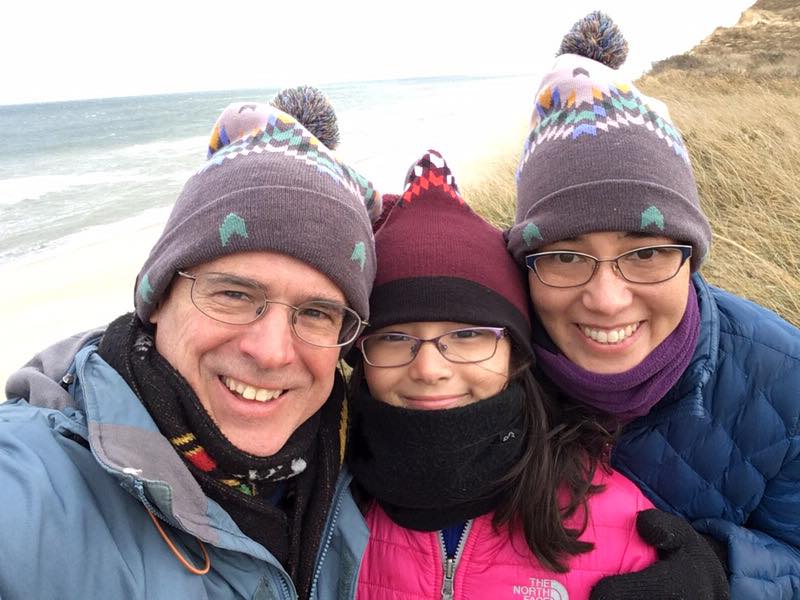Philip Suraci Jr.
Playwright, Peace Educator

Philip Suraci lives with his understanding wife, educator and filmmaker Christina Biddle, and their dynamic daughter, Nicola, in bucolic South Orange, NJ.
Born in Perth Amboy, New Jersey, his wonder years were spent in Chatham Township, NJ developing interest familiess in theater, skateboarding, sex, skiing, soccer, and rock and roll. Though he practices Nichiren Buddhist, he is proud to have both his birthday on December 25th and have played Jesus in “Godspell.” He moved to New York City to go to college and never looked back (in spirit, at least!).
He has studied and performed with Anne Bogart at the Experimental Theater Wing at NYU, acting in “At the Bottom” by Maxim Gorky and later in “History: An American Dream”. He was a board member and actor with the badneighbors theatre company, performing in the North American premiere of Marston’s “Antonio and Mellida” and originating roles in “Pink Vinyl/Blue Guitar,” “The Monk”, “Sedewick Downing Harbor” by Christopher Renstrom and “Three Stories High” by Madeline Olnek. He worked at the International Theatre and the English Theater in Vienna, Austria starring as Allen Felix in “Play it Again, Sam” and in the continental premiere of A.R. Gurney’s “The Dining Room.”
Philip worked as radio disc jockey, production and program director at WVIP in Mt. Kisco, New York. He created, produced, wrote, and co-hosted with Ritch Duncan, the radio comedy game show “Good Question” heard on WMCA radio in New York, which aired for more than 100 episodes. He produced, directed, and performed radio drama on WBAI radio in New York.
While doing the weekly research for “Good Question,” he became aware of the lack of interest in the subject of history by many of today’s students and came upon idea of using drama to teach history thus bringing immediacy to the subject matter. He then enrolled in the Educational Theatre program at NYU. There he studied the technique of process drama under Philip Taylor and Augusto Boal’s Theatre of the Oppressed with Chris Vine of the Creative Arts Team. He received his M.A from NYU in 2004. Through the C.A.T. Youth Theatre, he discovered the power and originality of the voices of youth and began to look for ways to bring those voices to the stage—the result of which was “Lysistrata’s Children.”
About the process of developing “Lysistrata’s Children” Suraci writes: “I hoped to create a peaceful response to the human plagues of war and violence using classical references voiced through young people. I asked actors to research the history of war in the U.S., to create collages based on the theme of war and peace, as well as compose prose poems inspired by the art and poetry of child war victims. In rehearsal, we brainstormed methods that children use to get their parents to do what they want, and later, strategies employed by parents to control their children. In small groups, the actors created short scenes based on these ideas. These embryonic “scene-lets” became the basis for individual scenes in the piece itself, which I structured and wrote out more fully. Much of the dialogue concerning thoughts about war was culled from a discussion in rehearsal on the topic of “Is war necessary and if so, when?”
The success of “Lysistrata’s Children”, presented by Theater for the New City in NYC, led Crystal Field, Executive Director of TNC, to offer Suraci a residency to create new, socially conscious plays with young people.
In 2010, Suraci founded TheaterPeace whose mission is to create dialogue between generations to foster peace and humanity. In May 2010, TheaterPeace produced “Generation buY” a play about marketing to children. In May 2011, TheaterPeace presented “Catch Her in the Lie” about teens views on the hypocrisy of adults and the search for the best way to live a human being.
Philip adapted “Lysistrata’s Children” into the screenplay for the (unproduced) feature film “Peace Kid.” “Lysistrata’s Children” won the Family Feature Screenwriting contest at the Nashville Film Festival in 2015. Having read many graphic novels to his daughter, particularly the work of Raina Telgemeier, He realized that “Peace Kid” could be made into a book speaking to the dreams and sensibilities of today’s courageous youth. Yes how was a challenge travel so farIf you can imagine writing hey heart
